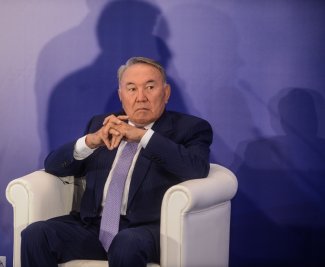Managed succession in Kazakhstan

In a television address to the nation on 19 March, the President of Kazakhstan, Nursultan Nazarbayev, unexpectedly announced his resignation from office. Nazarbayev stressed that he will remain at the head of the Security Council of Kazakhstan and the ruling party Nur Otan, and that he will retain special rights deriving from the titles he holds as the First President of the Republic of Kazakhstan and the Leader of the Nation (the ex-president will also remain a life member of the Constitutional Council). By this decision the 79-year-old president, who has ruled the country since 1989, has officially acknowledged the need to make a generational change. On 20 March (on the eve of the traditional New Year holiday of Nauryz, the functions of head of state were taken over by the Speaker of the Senate Kassym-Jomart Tokayev. He will perform the official duties until a new president is chosen in the election results. Tokayev's first action was to rename the country's capital city from Astana to Nursultan.
Commentary
- The president’s resignation begins the long-awaited process of the managed succession of power during the life and under the control of Nazarbayev. The outgoing president is the de facto creator of the modern Kazakhstan, and his formal and informal role in the state is difficult to overestimate. At the same time, over the years - as he observed the problems associated with succession in the authoritarian post-Soviet states, the Middle East and China - he has undertaken efforts to anoint a successor. In view of the limitations of this scenario, Nazarbayev has intensified efforts to strengthen the state’s institutions and political mechanisms and to manage the challenges of dynamic social changes more efficiently (including the effect of generational changes, identity transformations, modernisation processes, et al.) as well as their political consequences. Now, as he formally leaves office, he will keep many critical instruments of government, and thus control over the process, in his own hands. Under the law concerning the Leader of the Nation and the First President, Nazarbayev will remain the most important arbiter in issues of development, foreign and security policy. As chairman of the Security Council of Kazakhstan, he will retain control over all the departments of force, and as chairman of the Nur Otan party, he will still control the administrative apparatus of the state. In addition, key positions in the power departments have been staffed by people who are completely loyal, or who are related or affined to the clan of the president. The long-awaited moment of the start of the succession process has, it seems, both adapted to Nazarbaev's increasing limitations connected with his age and health, as well as to the symbolic overtones of the traditional Kazakh New Year holiday of Nauryz.
- The process of succession will begin in Kazakhstan with no designated successor. Speculation on this matter has been the main theme of political debate in the country for two decades. Traditionally, the favourites for this role have either been members of Nazarbayev's immediate family (especially his daughter Dariga, who has been Speaker of the Senate since 20 March this year), or trusted, longtime associates of the President (among them Tokayev). In practice - in the light of the problems that appeared in similar contexts in the past - we cannot completely rule out the emergence of a new candidate representing the younger generation, either from within the family as broadly understood, or from among the nomenklatura. One dark horse might be Samat Abish, the president's nephew, a general on the National Security Committee and also that body's first deputy chairman. It remains an open question at this point as to how a candidate for the office of the president will be selected: such an individual could be clearly indicated by Nazarbayev, but one cannot rule out a controlled electoral rivalry between two or three candidates. This variant would - under supervision by the Leader of the Nation - allow the most efficient successor to emerge in a confrontation with the elite and society of Kazakhstan, and thus with a mandate from them (although they would be incomparably weaker and remain under Nazarbayev's control). Meanwhile, any serious competition to the candidate/ candidates of the ruling government from the opposition can be very definitively ruled out. The ruling camps dominance in the political life of the country is unquestioned; moreover, there is no leader who could stand at the head of the opposition, which so far has been very unorganised. Irrespective of the results, the current campaign will be of fundamental and formative importance for the future of Kazakhstan's political system in the dimension of its political and symbolic culture (as the first transfer of power in the country's contemporary history), as well as for the role and scale of pluralism within the elite and society.
- Although the succession process is subject to Nazarbayev's strict supervision, we may expect a variety of unprecedented tensions - both sharp frictions within the elite itself, as candidates for the presidential election emerge and during the election campaign, and also social protests. The latter - which have had both a social and a de facto political character - have intensified in recent years, together with the country's deep generational changes; the election campaign will thus be the best opportunity for the disgruntled to articulate their demands. No doubt, as in the past, they will be fuelled from abroad by the émigré opposition, and exploited by the neighboring countries - mainly Russia and China, for which the succession of power in Kazakhstan is of strategic importance. In this context, it is significant that Tokayev has been chosen as the acting president and as the person who will be responsible for organising the elections. He is seen as an experienced politician and efficient both on the domestic (he has served as prime minister, among others) as well as the international stage, as he has already held important diplomatic positions in relations with China, Russia and the US.
- The present process of managed succession is a part of the wider transformation process of modern Kazakhstan's public institutions. The state evolved under Nazarbayev’s leadership during the terminal phase of the Soviet Union's existence. With all his limitations, Nazarbayev was a stabilising factor guaranteeing the system, both internally and internationally. In the light of experience we may assume that the process of identifying a successor will be successful, and the period of cohabitation between the old and the new president will be effective. The turning point and the test for the state will come with Nazarbaev's actual departure from political life, a moment which - given the role he has played in regional policy, serving as a shock absorber for the Sino-Russian rivalry - will also be a challenge for the whole of Central Asia.





